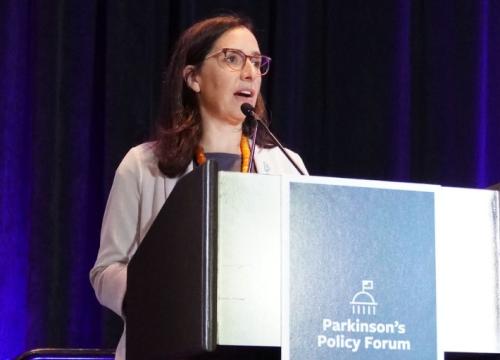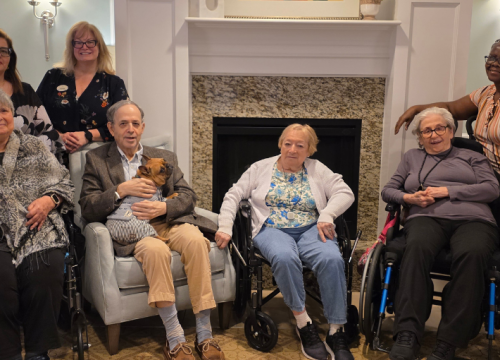10 Interesting Facts About Parkinson's Disease

At the Parkinson’s Foundation, one of our goals is to raise Parkinson’s disease (PD) awareness and how the Foundation supports those living with the disease and their loved ones. If you are familiar with Parkinson’s you probably know most of the items on this list, but we encourage you to share this article with someone who may not be familiar.
1. The cause is unknown and there is no cure.
What causes Parkinson’s remains largely unknown. Genetics cause about 10 to 15 percent of all Parkinson's. The other 85 to 90 percent of cases are classified as sporadic (or occasional). Although there is no cure, treatment options vary and include medications and surgery.
→ Keep reading: What is Parkinson’s
2. People with Parkinson’s can have a good quality life.
There is no one-size-fits-all treatment approach when it comes to PD. While medication is the most common treatment, surgical therapy and lifestyle modifications, like rest and exercise, help manage the disease. Shop around until you find what works best. Find your ideal support group, therapist, exercise class and complementary therapy.
→ Keep reading: Find resources in your area
3. No two people have the same exact symptoms.
The progression of symptoms is often a bit different from one person to another due to the diversity of the disease. People with PD may experience: tremor (mainly at rest); slowness of movements (bradykinesia); limb rigidity; gait and balance problems.
→ Keep reading: Managing Parkinson’s
4. Non-movement symptoms can be more troublesome than motor symptoms.
In addition to movement symptoms, from tremor to balance issues, most people with PD also develop non-movement symptoms that many consider more disabling. They can include:
- Cognitive changes: problems with attention, planning, language or memory
- Mood disorders, such as depression, anxiety, apathy and irritability
- Fatigue
- Hallucinations and delusions
- Lightheadedness (orthostatic hypotension)
- Sexual problems, such as erectile dysfunction
- Sleep disorders, such as insomnia
→ Keep reading: Non-Movement Symptoms
5. Small Handwriting and loss of smell are early signs of Parkinson’s.
A change in handwriting, specifically handwriting that’s gotten smaller over time or crowded, are an early indicator of PD. Another common early sign is the loss of smell of foods like bananas, dill pickles and licorice.
→ Keep reading: 10 Early Signs of Parkinson’s Disease
6. Exercise helps manage Parkinson’s symptoms.
For people with Parkinson’s, exercise is more than healthy — it is a vital component to maintaining balance, mobility and activities of daily living. Exercise and physical activity can improve many PD symptoms. The Parkinson’s Outcomes Project shows that people with PD who start exercising earlier and a minimum of 2.5 hours a week experience a slowed decline in quality of life compared to those who start later. Tai chi, yoga, Pilates, dance, weight training, non-contact boxing and more all have positive effects on PD symptoms. Watch our Fitness Friday videos.
→ Keep reading: Exercise
7. Parkinson’s should be treated through a team approach.
The Parkinson’s Foundation recommends people diagnosed with PD seek out a movement disorders specialist. These specialists are more likely to include other healthcare professionals who can help tackle day-to-day PD challenges in a care team, such as physical therapists, occupational therapists, speech therapists or nutritionists.
→ Keep reading: Importance of Expert Care
8. People with Parkinson’s are not always angry or sad.
Many people with Parkinson’s experience facial masking — reduced facial expression. Often, people with PD look serious, depressed or mad, but many times it’s just that PD is causing muscles in the face to be stiff or take a long time to move.
→ Keep reading: Facial Masking
9. Designated Centers treat Parkinson’s.
The Parkinson's Foundation leads the development of new treatments through its Centers of Excellence network, comprised of 47 international leading medical centers, staffed by renowned PD specialists. These centers deliver care to more than 193,000 people with Parkinson’s. Participating centers also play a key role in the Foundation’s Parkinson’s Outcomes Project, the largest clinical study of Parkinson’s ever conducted.
→ Keep reading: Centers of Excellence
10. The Parkinson’s community is strong.
The Parkinson’s Foundation is here for our global Parkinson’s community — that includes family members and caregivers. The Foundation hosts Moving Day walks across the nation and also provides additional ways to get involved — donate, volunteer, host a fundraiser, join PD Conversations or advocate.
→ Keep reading: Get Involved
We’re here for you. Get answers to your Parkinson’s questions when you contact our Helpline at 1-800-4PD-INFO (473-4636) or Helpline@Parkinson.org.
Related Blog Posts

Shaping the Future of Parkinson’s Policy: Meet Our Chief Strategy and Policy Officer

10 Tips for Playing Pickleball to Stay Active with Parkinson’s
